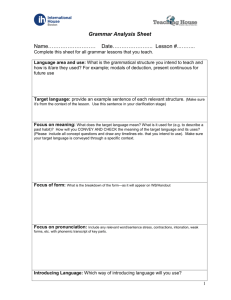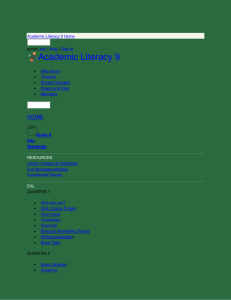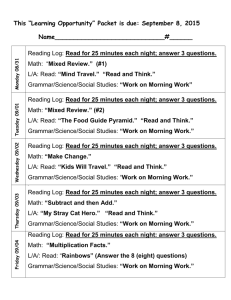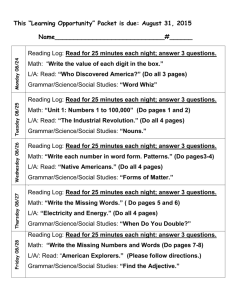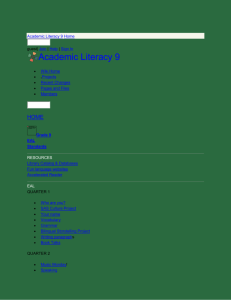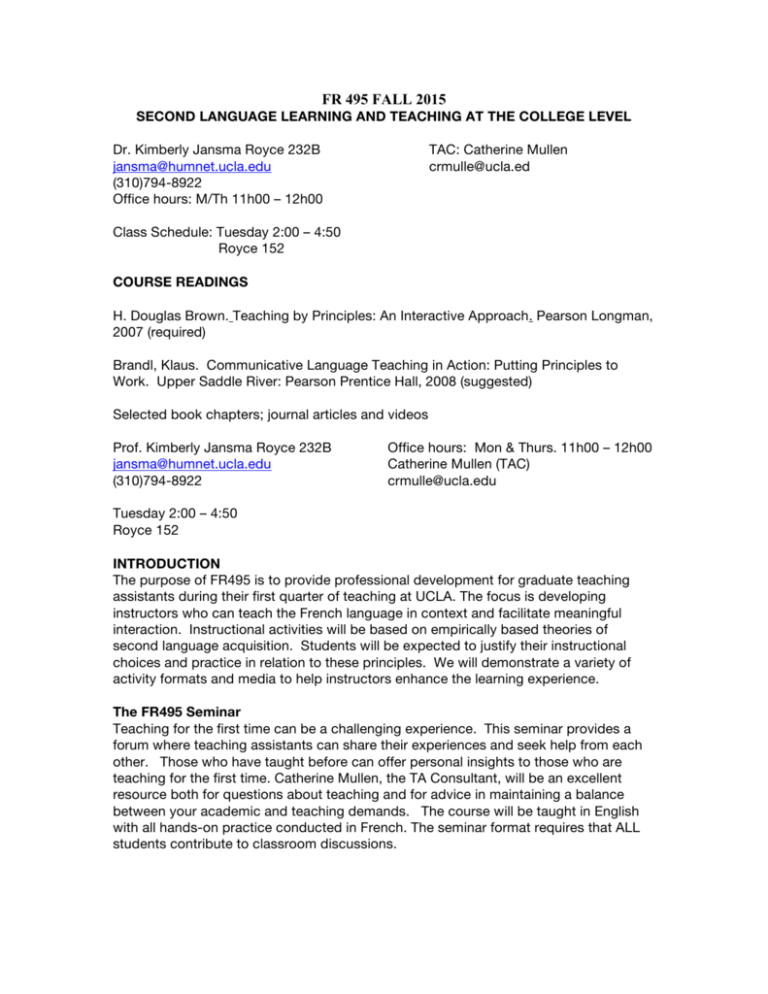
FR 495 FALL 2015
SECOND LANGUAGE LEARNING AND TEACHING AT THE COLLEGE LEVEL
Dr. Kimberly Jansma Royce 232B
jansma@humnet.ucla.edu
(310)794-8922
Office hours: M/Th 11h00 – 12h00
TAC: Catherine Mullen
crmulle@ucla.ed
Class Schedule: Tuesday 2:00 – 4:50
Royce 152
COURSE READINGS
H. Douglas Brown. Teaching by Principles: An Interactive Approach. Pearson Longman,
2007 (required)
Brandl, Klaus. Communicative Language Teaching in Action: Putting Principles to
Work. Upper Saddle River: Pearson Prentice Hall, 2008 (suggested)
Selected book chapters; journal articles and videos
Prof. Kimberly Jansma Royce 232B
jansma@humnet.ucla.edu
(310)794-8922
Office hours: Mon & Thurs. 11h00 – 12h00
Catherine Mullen (TAC)
crmulle@ucla.edu
Tuesday 2:00 – 4:50
Royce 152
INTRODUCTION
The purpose of FR495 is to provide professional development for graduate teaching
assistants during their first quarter of teaching at UCLA. The focus is developing
instructors who can teach the French language in context and facilitate meaningful
interaction. Instructional activities will be based on empirically based theories of
second language acquisition. Students will be expected to justify their instructional
choices and practice in relation to these principles. We will demonstrate a variety of
activity formats and media to help instructors enhance the learning experience.
The FR495 Seminar
Teaching for the first time can be a challenging experience. This seminar provides a
forum where teaching assistants can share their experiences and seek help from each
other. Those who have taught before can offer personal insights to those who are
teaching for the first time. Catherine Mullen, the TA Consultant, will be an excellent
resource both for questions about teaching and for advice in maintaining a balance
between your academic and teaching demands. The course will be taught in English
with all hands-on practice conducted in French. The seminar format requires that ALL
students contribute to classroom discussions.
Attendance: Regular attendance and participation are essential for the success of this
course. If for any reason you need to miss a session, please notify Professor Jansma
and Catherine Mullen in advance.
COURSE WORK
• Readings and discussion: You are expected to come to class prepared to
discuss the assigned readings in relation to your own experience as a language
teacher or learner. Each week students will receive study questions related to
the readings. Respond on the discussion board. Contributions and responses
are due by midnight of the assigned date. Begin by introducing yourself in
French or English, e.g. “Bonjour, c’est Julie. . .”
•
Hands-on activities:
Micro lessons: Each student will present 3 microteaching lessons including (1)
an oral communicative activity, and (2) a reading lesson. Discussion comments
and feedback will follow. Activity handouts (if required) will be made available to
the students. Provide the instructor with a copy of the lesson plan.
Lesson plans: Each student will submit two - three detailed lesson plans
following the proscribed format.
Classroom observations: Each student will conduct three peer classroom
observations and submit their observations using the format provided. One
observation will be of a beginning language class other than French.
Final Project: Students will team teach and submit a detailed lesson plan for
an original “task-based” activity that includes authentic new media.
Pilot classes: The pilot classes for FR I - III are a fundamental part of the
Methods course. The pilot course instructors will stay a day ahead of the
course schedule so that you can use this time to prepare your next day’s lesson.
You are encouraged to attend as many classes as fit your schedule.
Minimum attendance:
Weeks 1 – 5: 3 days/wk
Weeks 6 – 8 2 days/wk
Weeks 7 – 10 attendance optional
Although FR 495 is graded on a Satisfactory/Unsatisfactory basis, to pass the course
you must demonstrate mastery of the material (a grade B or better).
Your grade will be calculated as follows
Participation (includes discussion forum)
Lesson plans & Observations
Micro teaching (includes handouts)
Task-based final project
40%
20%
20%
20%
FR 495 COURSE SYLLABUS FALL 2015
Orientation: Read Brown Chapter 4: Teaching by Principles
Preparation for first class: Read Brown Chap.1 “Getting started.” Prepare to discuss
instructor choices (Analyzing the lesson pp. 8 – 10). Read Brown Chap. 3: “The
Postmethod Era” Answer questions: 4, 7 -8 (p. 59 – 60). Discussion Board
Week 1 Monday, September 28: Getting Started – Methods and Approaches
Warm up discussion: The first week of class – What happened? What went well/ less
well? What micro decisions did you make? How would you describe your students?
(Questionnaire & performance). What SLA principle did you apply? What is your
primary question /comment for the group?
Discussion: Brown Chap. 1 “Getting Started”
Lecture: Brief History of Methods; the Post method era (hybrid classes and flipping
the classroom)
HW: 1) Read Brown Chap 3: Question 7. Discussion Board: 1) Write your own
definition one of the following Language Teaching Methodologies: a) task-based
learning, b) learner-centered instruction, c) cooperative learning, d) whole language
education, e) audiolinguialism f) grammar translation and g) content-based instruction.
2) What Teaching Methods have you experienced as a student? (If they were eclectic,
explain) 2) Brown Chap 22 p. 435 “Current issues in vocabulary teaching”; and 3) “The
effects of three types of attention drawing techniques on the acquisition of English
collocations” Ehsan & Tahereh 2012 – Bring to class 3 collocations you’ve found from
a French source on the Internet.
Week 2 Monday, October 5: Vocabulary and Pronunciation
Warm up discussion: Language teaching methodologies; Vocabulary teaching: What
vocabulary did you introduce this week and how? What strategies do you use to learn
vocabulary? What words bring up different images in French & English? Why is
understanding vocabulary in context difficult in French? How many words do people
typically know?
Lecture: Teaching vocabulary: What words do we teach and how? Working with
idiomatic expressions and colocations; specific attributes of the French lexicon.
Working with cognates. Combining images, teacher talk and non-linguistic
tasks/response. Learning strategies: association, acoustic/semantic/visual depth of
processing. Using dictionary and concordance
Workshop: Writing a chapter exam
HW: Study IPA (Dansereau); Exercise: Phonetic transcription.
Listen: Radio Lab - “Musical language: Behave so strangely” Discussion Board
response.
Microlesson: Prepare a vocabulary micro lesson to teach in class w/ required visuals
& handout.
Read Brown Chap. 10 “Lesson planning” Submit a lesson plan w/ class copies
following the model provided for a teaching day in the syllabus week 3. Read Brown
Chap. 22 “Form-focused instruction.” Pp. 419-434
Week 3 Monday October 12: Vocabulary, Pronunciation (suite) & Lesson
Planning
Lecture & Workshop Vocabulary & pronunciation: “The sounds of French with focus
on the vowel system; Contrastive analysis (French/English phonological systems),
prosody “Musical language: Behave so strangely”, the phonetic alphabet (for
instructors); strategies for teaching pronunciation.
Warm-up Discussion “Musical language” & “Rite of Spring”
Microlessons: Vocabulary presentations
Lecture & workshop: Pronunciation
Peer review: Lesson plans
HW: Read Brown Chap. 22 “Form-focused instruction.” Pp. 419-434; Discussion
Board – Grammar: Answer questions.
Week 4 Monday, October 19: Grammar and Form-focused Instruction
Warm-up Discussion: What structures have you taught so far? Did you use an
inductive/deductive approach or a combination? What are the pluses/minuses of
explicit grammar teaching this helpful. What specific aspect(s) of French grammar
make it difficult / Easy to learn? What do you find most difficult about French / English
grammar? What French grammar will require the most explicit form-focused attention?
Which areas will students “pick up” from context?
Lecture: Form focused instruction and the teaching of French grammar
Workshop: Form/meaning pairings
HW: Micro lesson prepare a meaning focused grammar presentation followed by an
“assimilation” activity. Select a structure that you haven’t yet taught.
Read: Brown chap. 20: “Teaching reading” Study questions: 4C, 7 (I); 8G. & Brown
Chap 18: Teaching listening
Handouts (Brandl pp. 354 – 355) Task 3: Effective Reading Strategies; Look over the
list of reading strategies (Brandl p.354). & indicate the strategies that you believe are
most effective (top 5); least effective (bottom 3); those that are more useful at a higher
level (2) Task 4: Rhetorical organization: Bring your response to class.
Discussion Board: Discuss your choice or reading strategies. Talk about how you
apply them in L1 or L2 reading.
Week 5 Monday, October 26: Receptive skills: Reading and Listening
Warm-up Discussion: Class business & Reading strategies
Microlessons: Grammar presentations w/ lesson plan and student handouts
Lecture: The reading process: Making authentic texts accessible; schema theory and
reading; top down and bottom up processes; Pre-reading/reading/post-reading
activities (Analyze the format of a “Lecture” in Motifs).
Listening & Viewing: What makes an effective listener? Workshop:
Workshop: Listening
HW: 1) Microlesson – Teaching a text: Carefully select an authentic reading
that has NOT been used for teaching purposes. .
a) Explain your text selection and how/where it would fit in a syllabus;
b) State the level for which it would be appropriate
c) Develop and write out pre-reading/reading and post reading activities
(handout copies for class members.)
2) Read: Brown Chapter 21: “Teaching writing”
Classroom observation 1: Observe a colleague’s French class in first year (you
can skip a pilot class). Fill out the observation form (leaving instructor’s name
blank.)Submit Classroom observation by Monday, October
Week 6: Monday, November 2 The Writing Process & Feedback
Warm-up Discussion: Observations: What can you notice as an observer that you
might not realize as the instructor? What aspect of the class was most important to
you? How might you modify the observation form to make it most useful to you as an
instructor?
Microlesson: Readings w/ lesson plan and class handouts
Discussion: The writing process writing process: What kind of writing instruction have
you had? How much emphasis has been placed on writing in your own experience?
How have your instructors provided feedback? What is most helpful:
consultation/correction code/comments in margins/track changes. What do you do
with this feedback – these corrections? Why or why not is writing important?
Do you think you are graded primarily on form or content? How do you go about
writing? How has the Internet/social media affected your writing or writing in general?
Lecture: Composing in a second language 2) Evaluation of student compositions 3)
Topic selection; 4) Establishing clear and useful guidelines - rubrics 5) Avoiding
plagiarism 6) evaluation templates; creating and using correction codes
Workshop: Grading essays
HW: Bring copy of ungraded student writing to class (best/middle/worst) Read: Brown
chapter 7: Teaching across proficiency levels.
Week 7 Monday, November 9: Norming essays; ACTL Proficiency
Guidelines
Warm up : a) Writing: Peer correction of student essays (hands on). b)
Lecture: ACTFL Oral Proficiency Guidelines and Interview (OPI)
HW: 1) Read “Developing Task-based activities” (Lee) - Application activities (Your
final project will be a task-based activity). 2) Study the ACTFL Guidelines to prepare to
evaluate language samples. 3) How important is culture in a second language
curriculum? Should it be taught in the TL or NL? How do we avoid teaching
stereotypes? Where do we get our information? What aspect of French culture would
you like to teach? What is intercultural competence and describe its elements and
goal. How to include the francophone world?
Classroom observation 2: Observe a class taught in another language.
Week 8 Monday, November 16: Using Media for Teaching Culture and
Language & OPI testing
Warm up discussion: 1) Teaching culture – Intercultural competence 2) Teaching “la
francophonie” 3) New media and the teaching of culture 4) Task-based instruction & the
teaching of culture.
Workshop: Evaluation of OPI-based samples
HW: 1) Read: “Why is it so difficult to teach language as culture?” 2) Read: Computerassisted language learning: Trends and Issues revisited (Garrett) (Fiche pédagogique)
Week 9 Monday, November 23 : New media and language instruction
Week 10 Monday, November 30: Final presentations – Task based lesson

